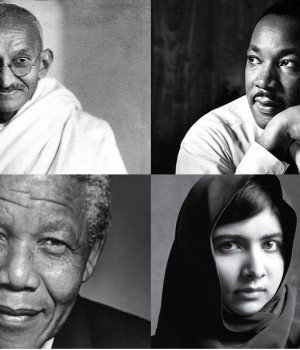The leadership landscape in the 21st century is almost certainly different to what you prepared for.
Market volatility, strategic uncertainty, competitive complexity, and ethical and moral ambiguity mean every day is different. How can you succeed as a leader in this environment?
The great leaders of recent history can provide some clues.
1. Know your purpose
When you are navigating the fog and challenges of life and business you need a reference point toward which you are heading. For Martin Luther King this ‘North Star’ was freedom for African-Americans.
Dr Cory (CT) Vivian, a personal friend of King, told me that ‘Martin wanted to serve, and the best place to do that was in the South. He could have stayed at the seminary (after completing his doctorate)’.
King knew his purpose and focused on it unrelentingly.
Why does your firm exist? Do you have a clearly articulated purpose — more than making money — that gives meaning to the people who work with you and for you?
Is your purpose, for example, to help people stay connected, or to enable communities to prosper, or to protect wealth for future generations?
Many businesses have implicit purposes like these but have failed to articulate it. In the 21st century you need purpose, not just vision.
2. Put people first
The great leaders don’t see problems, they see people who have problems. They see people who need help. Malala, for example, sees girls — initially her own friends — who were refused an education, and decides to do something about it.
Who are the people who work for you and who you touch via your products and services?
Paul Polman at Unilever points out that ‘business cannot prosper in a community that fails’. Leaders recognise people with hopes and dreams and aspirations, not machines who just deliver outcomes for companies.
3. Take responsibility
Great leaders have the courage to say ‘it stops with me.’ They refuse to accept the status quo and don’t agree when others say ‘this is the way things are.’
Gandhi was not the first Indian thrown off a train by an oppressive regime, but he said ‘this stops with me.’ He refused to be a bystander and watch others suffer, and set about bringing change.
Are there any practices in your organisation and industry that exploit people? Do you, for example, maximise profit by minimising wages? You may be surprised when you speak out who many people are waiting for your leadership.
4. Focus on changing minds, not behaviours
This is something unique to great leaders, and could be the defining characteristic. Great leaders recognise not just that change requires an entirely different way of acting. They understand the need for an entirely different way of thinking.
The great leaders don’t necessarily tell others how to act. They act in a way that encourages you to think differently, which allows you to choose to act differently.
When Malala talks about the Taliban who shot her at point blank range she speaks of her love for him and his companions. Being in her presence and hearing her speak challenges my thinking, giving me an entirely different perspective.
Most leaders focus on behaviour change. Mandela in his younger life, for example, formed a view that black South Africans were party to an undeclared war and so could justify using violence against the state.
As Gandhi pointed out, however, an eye for an eye means the blind end up leading the blind. When Mandela was released from jail and called for truth and reconciliation rather than violent overthrow he fostered a new way of thinking in South Africa.
When Paul Polman said ‘we are going to double the size of the business while halving our use of the world’s resources’ he sponsored mindset change. Staff engagement, community impact and company results all improved at Unilever.
Be clear about your purpose and the people you touch. Decide to not tolerate exploitation in any form. Don’t waste your energy trying to get people to act differently.
Find a way to help people see another perspective so they are then able to think differently. Purpose, people, perspective — key insights on leadership from the great leaders that can inform your approach to leadership.
Anthony Howard is an executive mentor and founder of The Confidere Group. Known as the ‘CEO Whisperer’, Anthony has written and spoken extensively on Human-Centred Leadership and has recently released a book on the topic, Humanise: Why Human-Centred Leadership is the key to the 21st Century.






![How did Sean Clark build a $300 million turnover company from a $500 AdWords investment? [CHEAT SHEET]](https://anthillonline.com/wp-content/uploads/2016/03/SEAN-CLARK-cheatsheet-NSFU-02.pdf-Box-2016-03-16-14-43-21-300x194.png)

![Instagram for Business… in 12 steps [FREE INFOGRAPHIC]](https://anthillonline.com/wp-content/uploads/2015/08/Capture7-100x75.jpg)
![Five ways to manage your time by managing yourself, with Helen Ebdon [CHEAT SHEET]](https://anthillonline.com/wp-content/uploads/2015/07/ebdon-3d-cover-01--100x75.png)
![Seven steps to crafting the perfect email, with James Tuckerman [FREE REPORT]](https://anthillonline.com/wp-content/uploads/2015/08/7-steps-cheatsheet-3d-cover-nuova--100x75.png)
![The Ultimate Social Media Almanac with James Tuckerman [Cheat Sheet]](https://anthillonline.com/wp-content/uploads/2015/11/Screen-Shot-2015-11-26-at-11.24.55-100x75.png)
![How to secure meetings with high profile or busy business leaders [MONDAY MICRO BREAK]](https://anthillonline.com/wp-content/uploads/2013/04/quill-300x300.jpg)

![Five essential things to get right if you want to raise capital, with Bryan Vadas [FREE CHEAT SHEET]](https://anthillonline.com/wp-content/uploads/2015/08/vadas-3d-cover-01--300x194.png)
![How did Sean Clark build a $300 million turnover company from a $500 AdWords investment? [CHEAT SHEET]](https://anthillonline.com/wp-content/uploads/2016/03/SEAN-CLARK-cheatsheet-NSFU-02.pdf-Box-2016-03-16-14-43-21-100x75.png)
![How to confidently raise venture capital… with Jack Delosa [CHEAT SHEET]](https://anthillonline.com/wp-content/uploads/2016/04/jack-de-losa-confidently-raising-venture-NFSU-rebrand-01.pdf-Box-2016-04-19-12-37-42-100x75.png)
![New Zealand’s Xero eyes US IPO, further disruption as subscribers increase [INFOGRAPHIC]](https://anthillonline.com/wp-content/uploads/2014/07/sruuuuujana-212x194.png)
![Ever wonder if your ‘content marketing’ is really just crap? You gotta see this! [INFOGRAPHIC]](https://anthillonline.com/wp-content/uploads/2014/08/content-100x75.jpg)
![7 Business Lessons From Game of Thrones [INFOGRAPHIC]](https://anthillonline.com/wp-content/uploads/2014/10/infographic-games-of-thrones-041-100x75.jpg)
![How to build your own Media Empire… In seven steps with Nathan Chan [INFOGRAPHIC]](https://anthillonline.com/wp-content/uploads/2014/10/Nathan-Chan-Infographic-e1413419529176-100x75.jpg)
![5 Business Lessons From Tinder [INFOGRAPHIC]](https://anthillonline.com/wp-content/uploads/2014/10/Tinder-Elegant-Infographic-100x75.jpg)



